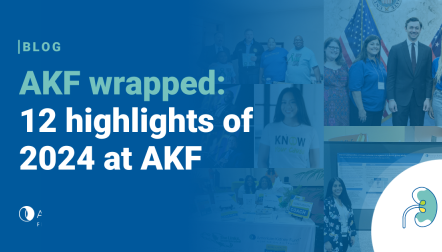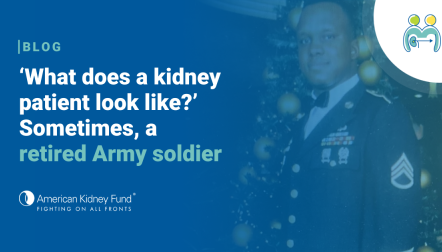
Blog post
Staying ahead of kidney disease with your family health history

Living a healthy lifestyle includes eating well and being physically active, but did you know that understanding your family health history is an important part of a healthy lifestyle, too? Your family health history is a record of medical information about yourself and close relatives. Knowing your family health history can help you and your doctor understand your risk for chronic health conditions including kidney disease.
If you are living with kidney disease, your family health history can also help you understand the cause of your kidney disease. Diabetes and high blood pressure are the most common causes of kidney disease. However, genes, infections and autoimmune diseases can also cause kidney disease. While you may not develop the same diseases that other family members have, your family health history can help your doctor monitor or screen you for health conditions earlier. Knowing if your kidney disease has a genetic cause can also guide your family planning.
We recently talked with AKF Ambassador Patrick Gee, who also serves as a member of AKF's Board of Trustees, about how learning about his family health history impacted his family's journey with kidney disease.
Please share how kidney disease has impacted you and your family.
Initially, I was the only person in my immediate family that had kidney disease, and as a parent, you never want your kids to experience the same fate that you went through. Being on dialysis, I know it was hard for Quenton, my son, to even see me dialyze. [When he was diagnosed, Quenton] called me from the emergency room, and I was going back and forth with the nephrologist (kidney doctor) as they were telling me that he has kidney disease.
[Quenton and I] sat and talked about it. I was upset and grieving because I didn't want anyone in my family to go through what I went through. Now, I am not only a dad, I am also a coach to him to try to help him manage his disease state and, of course, we share what we learn from our interactions with the American Kidney Fund (AKF). Even though I have received a kidney transplant, and he is working his way to get on the waiting list, you are never too old to learn, the way innovations are changing. We always had a good bond, but now kidney disease has brought us even closer.
What do you wish you knew about your family health history and kidney disease when you were first diagnosed?
Growing up I never heard anyone in my family talk about diabetes - it was referred to as "sugar" - so I never knew the correlation of diabetes being the number one risk factor of kidney disease. The bulk of my family grew up in a rural community where there was only one doctor, and they never received any health literacy. I wish I had a written-out family history of who had what, because it would have helped me in my kidney disease journey. When I got kidney disease, both of my parents were deceased, so I had no one to ask and talk to.
Diabetes and high blood pressure are the leading causes of kidney disease, however genetic causes of kidney disease are also common. What was your experience with genetic testing and how did you feel you benefitted from this experience?
I did not think about genetic testing until my son called me and shared his results of his genetic testing – positive for the APOL1 mutation. [The APOL1 mutation puts a person at higher risk of developing APOL1-mediated kidney disease (AMKD), a spectrum of kidney diseases including rare forms like focal segmental glomerulosclerosis (FSGS).] I had been working on the APOL1 study for six years. I was thinking, "Did I give my son the risk variant?" So, I went to talk to a genetic testing company [to get a test].
Because 83% of my genetic DNA comes from West-Sub Sahara African [which is where scientists think the mutation originated], I just knew that I was going to see that I gave Quenton the APOL1 mutation. However, they told me I didn't have it. I went on to do a health assessment with two at-home tests and both tests also came back negative for the APOL1 mutation. That did help me with understanding the probability of diseases when it relates to family history. Based on the genetic test, I decided to take preventative measures, to get ahead of it.
The worry is his daughter, my granddaughter, will be at risk for AMKD. We try to make sure she stays active and monitor her diet, but there is still an outside chance that she inherited the mutation, which puts her at higher risk for developing kidney disease. Quenton's diagnosis has helped us maintain staying ahead instead of falling behind.
I am grateful that I was able to do at-home DNA testing, but it should not be so hard for people to get genetic testing. I was leery on how accurate information was between the two at-home DNA companies, but I had a great experience. When you look at Black communities and folks being genetically pre-disposed, genetic testing should be affordable and accessible to everyone. Editor's note: There are now tests that check for genes specifically associated with kidney disease. Some may be available for free or at low cost with a doctor's order. Check out AKF's genetic testing page for more information.
Talking with family members about health can be difficult. However, sharing health information with each other can help prevent and diagnose illnesses much earlier. What are some strategies or tips you use to communicate about kidney disease with your family?
Everyone in my family knows I have kidney disease. My daughter also has lupus nephritis, and she is a nurse. We are always sharing information, whether it is about kidney disease or the comorbidities surrounding it.
It is important to not create an environment with judgment and indictment. Let folks know it is ok to not be allright and to take their mental health into consideration. I personally like to let people know listening is a form of communication. I am good at listening when someone is venting. The bonus is my granddaughter [who also spreads the word about kidney disease]. She will tell me she works for Ben [Ben S., the associate director of patient advocacy at the American Kidney Fund]. AKF has her heart. She has even talked to some of her classmates about her daddy having kidney disease. The whole family is comfortable talking about kidney disease, and our family and friends respect it especially when it comes to eating certain things.
You would never expect a disease to bring a family together, but kidney disease did.
How do you plan to commemorate the holidays while managing the needs of your family members with kidney disease?
Kidney disease, diabetes and hypertension (high blood pressure) are prevalent in our family, so we must be cautious with preparing food, the discussion starts right there. For example, someone might say, "Those greens don't taste as salty as they used to, season the food a different way," and we can explain about kidney-friendly eating habits.
My church had a community Thanksgiving, so I had an opportunity to minister to people there who have kidney disease and heart disease. You never know what someone has when they walk through that door, so be mindful about how you prepare food. There is a gentle way of approaching it, even strangers. For example, "Hey tell me something about your family" as an opener. You can give education without ruining their [holiday]. Do it in a way that is inviting and safe, and people are receptive. That would be my opportunity.
Explore AKF's website to find out more about genetic testing, AMKD and family health history, as well as kidney-friendly recipes for cooking holiday favorites:





